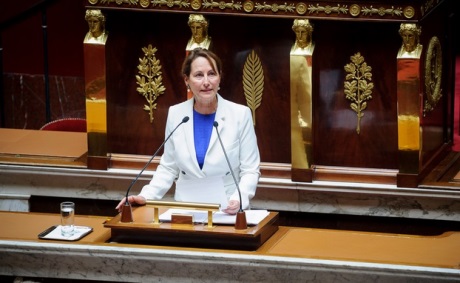France's National Assembly yesterday gave final approval of the country's energy transition bill. Under the legislation, France's reliance on nuclear energy will be reduced to 50% of power generation by 2025.
 |
| Energy minister Royal speaks to the National Assembly following adoption of the energy transition bill (Image: French energy ministry) |
French president Francois Hollande's 2012 election pledge was to limit nuclear's share of French generation at 50% by 2025, and the closure of France's oldest nuclear power plant, Fessenheim, by the end of 2016. In June last year, following a national energy debate, his government announced that the country's nuclear generating capacity would be capped at the current level of 63.2 GWe. It will also be limited to 50% of France's total output by 2025. Nuclear currently accounts for almost 75% of the country's electricity production, making closures of power reactors appear inevitable.
Debate about France's Energy Transition for Green Growth bill began in the lower house of parliament - the National Assembly - last October, with deputies agreeing on the overall objectives of the bill. These include: a 40% reduction in greenhouse gas emissions by 2030 and a 75% reduction by 2050, compared with 1990 levels; halving overall energy consumption by 2050 compared with 2012; increasing renewable energy's share of final energy consumption to 32%; and cutting the share of nuclear in electricity generation to 50% by 2025.
Yesterday, following 150 hours of parliamentary debate - during which 5034 amendments were discussed in open session and 970 amendments were passed - the National Assembly adopted the legislation.
While not calling for the closure of any currently operating power reactors, the new policy means that EDF would have to close older reactors in order to bring new ones online. The utility is constructing an EPR unit at Flamanville which is currently expected to start up in 2017. EDF would therefore be forced to shut one of its reactors - most likely Fessenheim - by that time in order to begin operating the Flamanville unit.
The upper house of parliament - the Senate - has pushed for nuclear generating capacity to be capped at 64.85 GWe, which would have enabled Fessenheim to continue operating after the Flamanville EPR enters service. It had also called for no particular timeframe in which the 50% nuclear share should be achieved. However, both these were rejected.
The approved bill also sets long-term targets for France's carbon tax. Currently standing at €14.50 ($15.90) per tonne, this tax will increase to €22 ($24) in 2016, then to €56 ($62) in 2020, rising to €100 ($110) in 2030.
Addressing the National Assembly following the vote, energy minister Ségolène Royal said she "salutes the remarkable work done by the national representation and the quality of democratic debate in which, on every bench, the examination of this text gave rise."
She described the energy transition bill as "an ambitious and mobilizing law which will be the most advanced and complete in Europe (and indeed the world)."
Researched and written
by World Nuclear News






_15863.jpg)







